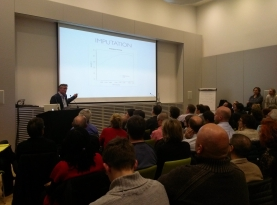The ENCALS satellite meeting 2014 was held on the 4th of december, prior to the 25th International Symposium on ALS/MND in Brussels. The satellite meeting was attended by almost a hundred researchers.
 The focus of the meeting was on collaborative projects. Amongst others, the projects SOPHIA, STRENGTH and Project Mine were discussed, including the minimal clinical dataset and harmonization of data collection procedures. Also, updates were provided on the ALS online genetics database, the ECAS and the development of new serum biomarkers.
The focus of the meeting was on collaborative projects. Amongst others, the projects SOPHIA, STRENGTH and Project Mine were discussed, including the minimal clinical dataset and harmonization of data collection procedures. Also, updates were provided on the ALS online genetics database, the ECAS and the development of new serum biomarkers.
The first large European project with this aim is SOPHIA, a JPND project. SOPHIA stands for Sampling and biomarker OPtimization and Harmonization In ALS. Barbara Thuss, research coordinator of ALS Centre Netherlands gave a brief update of the project. Seventeen European countries participate. The aim of SOPHIA is to harmonize data collection and data management to be able to use data of all centres in analyses to increase power. One of the most important deliverables of SOPHIA is the core clinical dataset that has recently been decided on. All centres participating in SOPHIA should collect this basic data for their patients participating in research projects, as a minimum. Centres can collaborate and use each other’s data to increase the numbers of patients and controls in their analyses and increase the statistical power of their research. When data is shared a data sharing agreement needs to be signed by the participating centres. Centres not participating in SOPHIA are very welcome to join the project, add their data and come up with data analyses projects using the vast data resource after signing a data sharing agreement.
Prof Ammar Al-Chalabi continued the program with his talk on the progress of STRENGTH, another JPND ALS research project. This project, which kicked off early 2014, has eleven European partners. STRENGTH combines results of the SOPHIA project (harmonization efforts in data collection) and of the large FP7-funded EuroMOTOR ALS research (development of an international database for data storage). The aim of STRENGTH is to discover factors that change the risk of ALS, trigger ALS or affect how rapidly it progresses, so that these factors can be used to design new treatments. STRENGTH consortium partners have DNA, exposure information and clinical information from people with ALS enrolled in pan-European population registers covering a population of about 120 million people. This is the largest such resource for studying ALS in the world and is unique because the information is population-based.
Dr Olubunmi Abel presented the ALS Online Genetics Database (ALSoD), a freely available database of ALS genes. In total 117 ALS genes are covered in the database. The database stores ALS-mutations along with some basic (non-identifying) clinical ALS patient information to facilitate the identification of a correlation between the genotype with the ALS phenotype. For instance, for each ALS gene figures show in which countries patients with this type of mutation are located. As most data in the database is retrieved from published papers, dr. Abel emphasized that the database is only as good as the data that go into it. Therefore, she requested centres to register on the ALSoD website and upload data or to contact her for help.
Finally, the presentation of Prof. Sharon Abrahams on the ECAS (Edinburgh Cognitive and Behavioural ALS Screen, a 20-minute test to screen for cognitive and behavioural changes in ALS patients) lead to a discussion about the international differences between countries in the percentage of ALS patients with cognitive symptoms. As this percentage differed significantly between countries, even though for all countries the patient scores are compared with the national norm scores. It was concluded however, that this most likely is a power issue, as some countries had only conducted the ECAS on forty patients/controls yet. More centres will conduct the ECAS assessment with more patients to establish reliable data of the percentages of patients with cognitive symptoms. Future presentations on this topic will show whether there really are national differences.
SOPs and minimal clinical dataset
More ALS centres working with the standard operation procedures and with the minimal clinical dataset means more opportunities for datasharing and more power for your statistical analyses. Data sharing agreements are available for centres to share their data for certain projects or papers. The Standard Operating Procedures (SOPs) of the European projects can now be found on www.encals.eu\collaborative projects. Or contact euromotor@umcutrecht.nl for more information about joining European projects and datasharing.
Read the report of this meeting on the ALS/MND research and care community blog.
Also, read the tweets about the ENCALS meetings with hashtag #ENCALS.